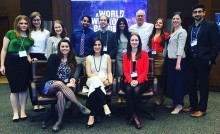In an interconnected world where ideas, capital, and people flow across borders seamlessly, what is the role of the international community in mitigating the threats that our world faces? On March 23 and 24, a panel of experts sought to find answers to this question at A Word With(out) Borders, the tenth annual Munk School graduate conference.
“The question which really underpinned most of the conference was ‘how do we respond to the changing role of borders in our world?’,” said Fatima Saya, MGA candidate and co-chair of the student-led conference. “I think that we came away with some important thoughts on this question.”
The conference began with a keynote by author Graeme Wood, known for his article in the Atlantic “What ISIS Really Wants.” ISIS has been on the public’s mind for its attempt to redraw borders in Iraq and Syria and the threat it poses to our globalized world. “Osama Bin Laden was kind of a kumbaya figure to us,” said one ISIS operative ominously when interviewed by Wood. However, Wood reassured the audience in his closing remarks that after his several years of research into ISIS “the more I learn about ISIS, the less afraid I am.”
The theme of globalized threats and how to respond carried into the panel discussions of the following day, beginning with “Borderless Threats”, which discussed intangible but persistent threats in cyberspace and finance. “We need to understand cyberspace as a multi-stakeholder domain,” noted Ron Deibert, director of the Citizen Lab at the Munk School of Global Affairs. The need for a cross-sectoral approach to these spaces was echoed by Matthew McGuire, a financial crime risk management expert, and Jon Lindsay, a political scientist and former military personnel who now teaches at the Munk School.
“Borders in Flux,” the second panel discussion, emphasized the changing borders in the South China Sea, the Levant and the Crimea region. Aisha Ahmad, a professor of Political Science at the University of Toronto, highlighted the use of narratives, “sometimes nostalgic, sometimes apocalyptic, but always rooted in historical grievances”, as a way to understand areas where borders are redrawn. Assistant professor at the University of Toronto’s Department of Political Science, Seva Gunitsky, spoke about strategic narratives in the Crimea region by pointing out that “sovereignty is organized hypocrisy,” which panelist Chris Chung, a PhD student in the Department of History at the University of Toronto, agreed also applied to the South China Sea.
The third and final panel, “Borders Rising,” brought together academics and practitioners to discuss refugee crises. David Morley, CEO and president of UNICEF Canada; Magdalena Dembinska, associate professor at the Université de Montréal; and Martin Schain, a professor of Politics from New York University, wrapped up the conference by trying to untangle what role the state and multilateral agencies have to play in handling flows of people across porous borders. Dembinska ended on a hopeful note by stating that “as difficult as it is, the refugee crisis is an opportunity to rethink EU policies.”
HEATHER MCALISTER
Published on April 4, 2016
